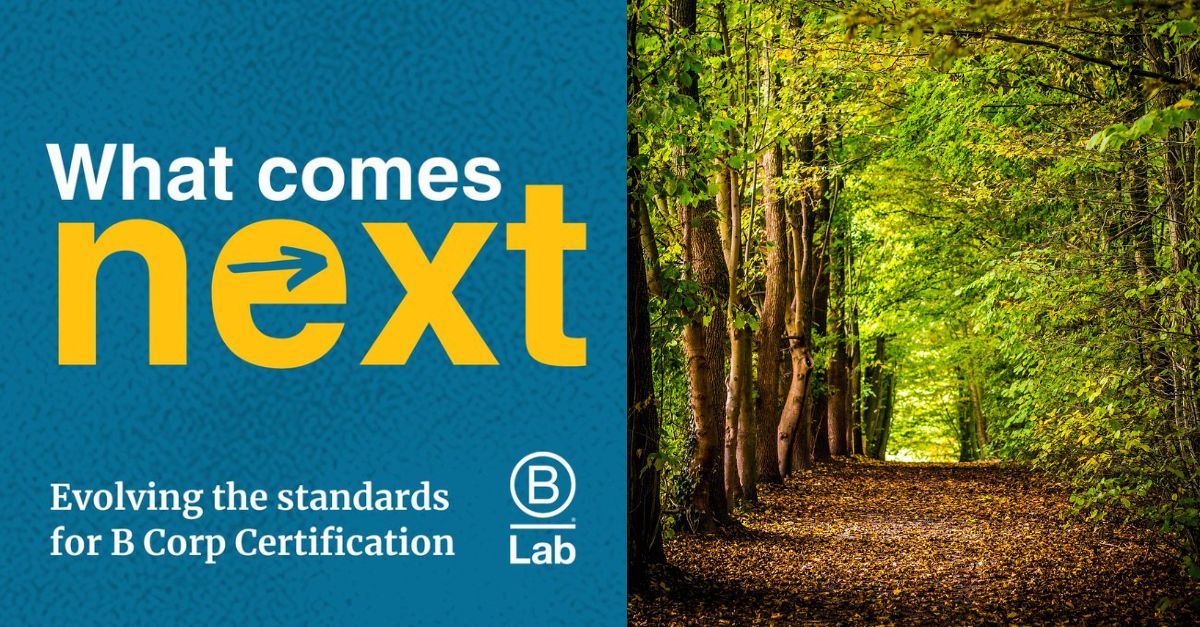Do you want to know how the new stage of B Corp certification is evolving? Find out in our second article on this topic.
Why are B Corp standards evolving? | What is the objective of the change? | What are the most significant changes? | What’s next?
The B Corp certification is in the midst of a transformation process and will incorporate new features in terms of focus, clarity, stringency, and flexibility of certification requirements. The new model will come into effect on January 1, 2025, so it is important for companies in the B Corp movement to start preparing.
Why are B Corp standards evolving? A changing and more demanding context explains its transformation.
Since its inception in 2006, B Lab’s purpose has been to transform the economic system towards a more inclusive, equitable and regenerative global economy. B Lab creates standards, public policies, tools, alliances and community networks that shift the behaviour, culture, and structural underpinnings of capitalism – with the ultimate goal of making companies a force for good. In these 17 years, the B Corp movement has grown exponentially and has 250,000 companies using its standards and more than 7,000 certified companies in more than 90 countries.
In a changing global context, with new social and environmental challenges becoming more and more urgent, B Lab recognizes that, in order to continue to fulfill its purpose, it needs to pivot the B Corp certification model. This is how, at the end of 2020, B Lab began the journey of evolving its standards to respond to the increasing demands of legal accountability and public transparency, especially in the European legislative framework, and to help all companies improve their impact and effectively differentiate leaders.
«In a changing global context, with new social and environmental challenges becoming increasingly urgent, B Lab recognizes that, in order to continue to fulfill its purpose, it needs to pivot the B Corp certification model»
At the end of 2022, B Lab presented a first proposal for the evolution of the B Impact assessment standards and approach. In addition, a first public consultation for feedback from the B Corp community was carried out to obtain diverse opinions, including certified companies, collaborators and other interested parties.
Currently, the B Corp certification standards are undergoing a second review and definition process to launch another proposal that meets stakeholder expectations in September 2023, to close version and pilot test in 2024, with final deployment scheduled for January 1, 2025.
What is the objective of the change? The evolution of B Corp certification aims to bring focus, clarity, and materiality.
As more knowledge is gained and best practices in impact are developed, B Lab’s goal is to drive and encourage a positive impact of companies more focused on responding to current social and environmental challenges, such as climate change or living wages.
To reflect these developments and challenge companies to raise their performance, the intention is to define clear and precise requirements common to all companies to better understand what it means to be a B Company.
What are the most significant changes? The new B Corp certification is evolving in terms of higher requirements and less flexibility.
According to the first proposal of the evolution presented in 2022, the B Corp certification model evolves in the following aspects:
Universal minimum requirements for all companies:
Companies, which previously had flexibility on how to obtain the minimum verified score (80 points), will now be required to meet all specific, demanding and common performance requirements.
Ten relevant and universally applicable topics have been identified, representing the minimum key performance areas to be integrated into corporate strategies in order to focus efforts, identify areas for improvement and generate a more positive impact. Thus, all B Corporations must comply with:
1. Stakeholder governance and purpose: it is required to define an Impact Strategy and determine mechanisms for consideration of stakeholders in material decisions, to act in accordance with a purpose that contributes to a substantial positive impact on society and the environment.
2. Commitment of employees: it is necessary to establish a two-way communication and respect the opinion of employees to foster their sense of belonging and commitment.
3. Living wage: the risk of wage gaps must be identified so that equal pay prevails, and workers can have access to a decent standard of living for themselves and their families.
4. Justice, Equity, Diversity, and Inclusion (JEDI): risks related to JEDI must be identified in order to promote inclusive and diverse work environments that contribute significantly to fair and equitable societies.
5. Human rights: social risks must be identified throughout the value chain to ensure dignified treatment, respect for human rights and traceability of the origin and social impact of raw materials.
6. Climate action: actions based on scientific data must be taken to combat climate change and its impacts.
7. Circularity and environmental management: it is required to demonstrate environmental management and contribute to the circular economy in the operations and value chain, especially considering climate, water, biodiversity, pollution, waste, and animal welfare.
8. Collective action: it requires actively working with stakeholders to achieve a collective social or environmental impact that is positive at the policy, industry, or business community level.
9. Impact management: it is required to measure the impact of the business in a comprehensive manner (in all the topics of the standard) and to establish objectives that must be approved by senior management and publicly disclosed, in order to demonstrate improvement over time.
10. Risk standards: potential negative impacts related to specific industries or practices must be avoided and/or managed; and the company’s lobbying activities must be aligned with the B Corp philosophy.
Evolution of the thematic structure of the standard:
According to the preliminary proposal, the appearance of the 10 minimum performance requirements for certification will coexist with the maintenance of the other topics of the standard not reflected in these 10, such as, for example, occupational health and safety or corporate giving and volunteering. In other words, these additional topics that will be part of the standard (but not part of the certification) will be reflected in requirement 9 “Impact management” and, although their compliance will not be verified, it will be mandatory to complete their questions.
Possible decrease in the weight of “Impact Business Models” (*):
In the same line, the evaluation of the Impact Business Model (MNI) will be reflected in requirement 9 “Impact Management”. It will not be mandatory to have an IBM to obtain certification, but those with a significant IBM (+10 points) will have to comply with specific improvement requirements, which will be covered within one of the identified topics.
Possible disappearance of the scoring system (*):
The preliminary proposal for the new B Corp certification standards did not envision a scoring system, as the 80-point barrier disappears by introducing minimum performance requirements (met or not met).
Mandatory continuous improvement:
It is proposed that companies will be required to set specific improvement targets to be assessed and verify compliance at the next audit for re-certification (every three years).
(*) The results of the public consultation on the first version show that stakeholders consider the scoring and significant weighting of “Impact Business Models” as critical aspects of certification to be maintained. B Lab is considering this feedback in the process of developing the second proposal to be submitted in September 2023.
What’s next? The path and timing to adapt to the new stage of B Corp certification.
In terms of timing, the change in B Corp certification will affect in different ways those companies already certified and those interested in being certified soon. Certified companies will have the opportunity to assess the application of the new standards in their next recertification and may choose whether to keep the current ones for one more cycle, while companies interested in becoming certified will start from scratch with the new performance requirements as of January 1, 2025.
«Given B Lab’s first proposal, which is very demanding, the new B Corp certification is expected to ensure that only truly leading companies can be certified»
Given B Lab’s first proposal, which is very demanding, the new B Corp certification is expected to ensure that only truly leading companies can be certified. Therefore, in the second draft of the new standards, B Lab will study specific and general adaptation to offer flexibility and a more proportionate set of requirements for companies with limitations.
In September 2023, B Lab will publish the second standards proposal and begin the second public consultation period to finalize the evolution of the new B Corp certification standards.
To address the evolution of B Corp certification, R4S can assist companies with the analysis of the new performance requirements for B Corp certification, as well as the planning and prioritization of the necessary actions to cover the identified gaps, and support in the implementation of initiatives and projects planned within a schedule that is aligned with the re-certification process.
Contact R4S Group if you are interested in entering this new stage of B Corp certification to transversally transform the corporate culture and incorporate practices that contribute to the well-being of society and the environment.

.
.
Information sources:
Evolving the B Corp certification performance requirements
La evolución de los estándares de la certificación B Corp – first proposal (September 2022)
Preliminary Consultation Summary Report (May 2023)






